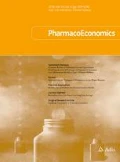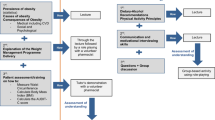Abstract
There is a global need for more training in pharmacoeconomics. Pharmacoeconomics is a relatively new discipline that draws from other more established disciplines; hence, multidisciplinary collaboration is recommended. Descriptions of opportunities for pharmacoeconomics education can be found in the literature and on websites, but research on the trends in pharmacoeconomics education is largely limited to training in US pharmacy schools.
Although basic pharmacoeconomics concepts and methods can be standardised for different countries and cultures, specific applications and examples will differ by region. There are also different levels of educational need (awareness, application, conceptualisation) and different methods of receiving pharmacoeconomics education (short courses, internships, fellowships, graduate degrees).
In order to assess educational goals, some educational programmes have moved toward the concept of developing and measuring ‘learning outcomes’, defined as the knowledge, skills and attitudes needed to fulfil the societal roles expected of the learner. This method can improve the standardisation of the educational process; however, there is still much work to be done in order to achieve real consensus on ‘learning outcomes’ in pharmacoeconomics.



Similar content being viewed by others
References
EPSA. European Pharmaceutical Students’ Association summary: pharmacoeconomics is vital to education. Pharm J 2002; 268 (7193): 506–7
Mazor KM, Campbell EG, Field T, et al. Managed care education what medical students are telling us. Acad Med 2002; 77 (11): 1128–33
Anell A, Svarvar P. Pharmacoeconomics and clinical practice guidelines: a survey of attitudes in Swedish formulary committees. Pharmacoeconomics 2000; 17 (2): 175–85
Ikegami N, Drummond M, Fukuhara S, et al. Why has the use of health economic evaluation in Japan lagged behind that in other developed countries. Pharmacoeconomics 2002; 20 Suppl. 2: 1–7
Hill SR, Mitchell AS, Henry DA. Problems with the interpretation of pharmacoeconomic analyses: a review of submissions to the Australian Pharmaceutical Benefits Scheme. JAMA 2000 Apr 26; 283 (16): 2116–21
Hess G, Watrous M, Strutton D, et al. Chapter 9: the role of pharmacoeconomics in response to globalization and increased competition in the pharmaceutical industry. In: Sam Salek, editor. Pharmacocoeconomics and outcome assessment: a global issue. Haslemere: Euromed Communications Ltd, 1999: 119–42
Drummond MF. The future of pharmacoeconomics: bridging science and practice. Clin Ther 1996; 18 (5): 969–78
Bootman JL, Townsend RJ, McGhan WF. Chapter 1: introduction to pharmacoeconomics. In: Bootman JL, Townsend RJ, McGhan WF, editors. Principles of pharmacoeconomics. 2nd ed. Cincinnati: Harvey Whitney Books Company, 1996: 4–19
Kozma CM, Reeder CE, Schulz RM. Economic, clinical, and humanistic outcomes: a planning model for pharmacoeconomic research. Clin Ther 1993; 15 (6): 1120–32
Jones D. Chapter 10: pharmacoeconomics and the future of the pharmaceutical industry: should they be encouraged to establish a pharmacoeconomic team?. In: Sam Salek, editor. Pharmacoeconomics and outcome assessment: a global issue. Haslemere: Euromed Communications Ltd, 1999: 143–68
Kong SX, Wertheimer AI. Outcomes research: collaboration among academic researchers, managed care organizations, and pharmaceutical manufacturers. Am J Manag Care 1988; 4 (1): 28–34
Copley-Merriman K, Vanscoy G, Angaran D, et al. Panel 4: education and skills needed to conduct, interpret, and use economic evaluations in healthcare. Value Health 1999; 2 (2): 88–91
ISPOR News. What do you consider an ideal training for the practitioner of pharmacoeconomic research?. ISPOR News 1999; 5 (1). Available from URL: www.ispor.org/news/articles/0501/ifits.html [Accessed 2003 Dec]
Paltiel D, Neumann PJ. Why training is the key to successful guideline implementation. Pharmacoeconomics 1997; 12 (3): 297–302
Draugalis JR. Updating skills: pharmacoeconomics as continuing education. Top Hosp Pharm Manage 1994; 13 (4): 72–6
Armstrong EP, Akaho E, Fujii M, et al. Evaluation of teaching pharmacoeconomics to Japanese students. J Pharm Teach 1996; 5 (3): 67–85
Rascati KL, Gagnon JP. Pharmacoeconomics education, managed care and the pharmaceutical industry. Am J Pharm Educ 1999 Winter; 63: 449–453
Milne R. Pharmacoeconomics ‘down under’. APOR News 1997; 3 (5). Available from URL: http://www.ispor.org/news/ articles/0505/downunder.htm [Accessed 2003 Dec]
Hayes RP, Eley W, Greenberg RS, et al. Linking health services research to education at an academic health center. Acad Med 1996; 71 (9): 957–62
Callahan M, Fein O, Stocker M. Educating residents about managed care: a partnership between an academic medical center and a managed care organization. Acad Med 2000; 75 (5): 487–93
Conill AM, Hillman AL. The future catches up: a medical school curriculum in health economics. Am J Med Sci 2000; 319 (5): 306–13
Guide to health economics, medical and pharmacy resources [online]. Available from URL: www.healtheconomics.com/education.cfm [Accessed 2003 Dec]
Jeurgens JP, Szeinbach SL, Smith MC. Will future pharmacists understand pharmacoeconomic research? Am J Pharm Educ 1992 Summer; 56: 135–40
Rascati KL, Conner TM, Draugalis JR. Pharmacoeconomic education in US schools of pharmacy. Am J Pharm Educ 1998 Summer; 62: 167–9
Carter JT, Ebel JA. A comparison of pharmacoeconomic topics in journals and entry-level pharmacy degree curricula. Am J Pharm Educ 2001 Spring; 65: 30–4
Jackson TR, Draugalis JR. Graduate pharmacoeconomic and outcomes research educational programs in colleges and schools of pharmacy: a five-year update. Am J Pharm Educ 2000 Spring; 64: 11–4
Gregor KJ, Draugalis JR. Education and training programs in US Colleges of Pharmacy. Am J Pharm Educ 1994 Winter; 58: 378–81
WLPS. World List of Pharmacy Schools [online]. Available from URL: http://www.cf.ac.uk/phrmy/WWW-WSP/ SoPList HomePage.html [Accessed 2003 Dec]
Rascati KL, Draugalis JR, Conner TM. Chapter 3: pharmacoeconomic education in schools of pharmacy. In: Sam Salek, editor. Pharmacoeconomics and outcome assessment: a global issue. Haslemere: Euromed Communications Ltd, 1999: 25–32
Paul JE. Pharmacoeconomic and outcomes research internship employer survey results [online]. Available from URL: http://www.ispor.org/news/articles/0901/intern_survey.asp [Accessed 2003 Feb]
Maio V, Girts TK, Lofland JH, et al. Pharmacoeconomic fellowships: the need for outcomes. Pharmacoeconomics 2001; 19 (8): 795–802
32. Maio V, Lofland JH, Doan QC, et al. Pharmacoeconomic fellowship programs: an evaluation of the organizational structure and educational components: ISPOR Fellowship Task Force Report [online]. Available from URL: www.ispor.org/ survey/results_fellowship.asp [Accessed 2003 Dec]
MSOWG The Medical School Objectives Writing Group. Learning objectives for medical school education - guidelines for medical schools: report 1 of the Medical School Objectives Project. Acad Med 1999; 74 (1): 13–8
Marsh W. Learning objectives task force: report on activities. Philadelphia (PA): ISPOR Leadership Meeting, 2002
35. Davey P. Incoming presidential address, ISPOR News 2002. Available from URL: www.ispor.org/news/articles/0804/ pres_address.htm [Accessed 2003 Dec]
AAMC Association of American Medical Colleges. Report V: contemporary issues in medicine: Medical School Objectives Project, 2001 Aug. Available from URL: http://www.aamc.org/meded/msop/msop5.pdf [Accessed 2003 Dec]
Annemans L. Learning outcomes task force: report on activities. Rotterdam: ISPOR Annual European Congress, 2002
Draugalis JR, Slack MK, Sauer KA, et al. Creation and implementation of a learning outcomes document. Am J Pharm Educ 2002 Fall; 66: 253–60
Mort JR, Messerschmidt KA. Creating an efficient outcome assessment plan for an entry-level PharmD program. AJPE 2001 Winter; 65: 358–62
Mehvar R, Supernaw RB. Outcome assessment in a PharmD program: the Texas tech experience. Am J Pharm Educ 2002 Fall; 66: 243–53
Wilkes M, Bligh J. Evaluating educational interventions. BMJ 1999; 318: 1269–72
Callahan D, Crosby JR, Davies D, et al. Outcome-based education. Dundee: Centre for Medical Education. AMEE Education Guide 1999; 14: 1–45
Acknowledgements
No sources of funding were used to assist in the preparation of this manuscript. The authors have no conflicts of interest that are directly relevant to the content of this manuscript.
Author information
Authors and Affiliations
Corresponding author
Rights and permissions
About this article
Cite this article
Rascati, K.L., Drummond, M.F., Annemans, L. et al. Education in Pharmacoeconomics. PharmacoEconomics 22, 139–147 (2004). https://doi.org/10.2165/00019053-200422030-00001
Published:
Issue Date:
DOI: https://doi.org/10.2165/00019053-200422030-00001




